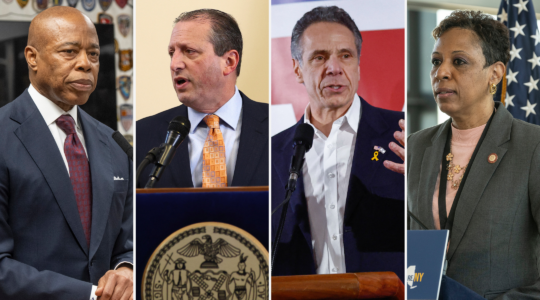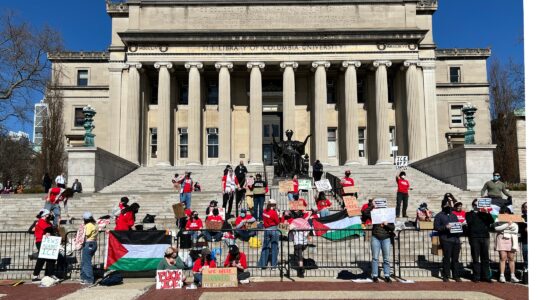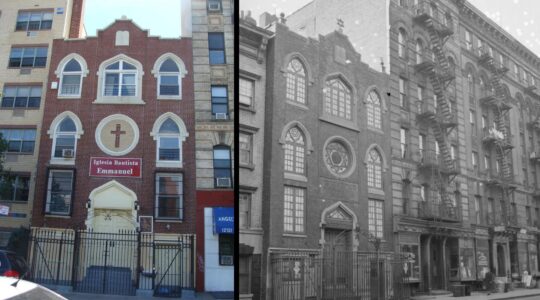(JTA) – As Jewish day schools begin in-person classes, a group of 138 Jewish doctors on Long Island are sounding the alarm over an uptick in Covid cases and a relaxing of precautions in local Orthodox communities.
“After a quiet summer, cases are now on the rise, specifically in our community. COVID-19 is not a political issue, nor is it old news,” the doctors wrote in an open letter. “If our goal is to keep shuls and schools open and our neighborhood stores in business, we need to recognize that the uptick demands that we take it seriously and follow appropriate precautions.”
Local doctors in several Orthodox communities have noticed slight upticks in Covid cases, with many resulting from summer camps, travel, bungalow colonies and particularly large weddings. Last month, New York City Mayor Bill de Blasio announced that 16 new cases were confirmed in Borough Park, home to the city’s largest chasidic population, with several of those Brooklyn cases connected to a large wedding.
The doctors’ letter explicitly referenced large weddings and other celebrations as events with potential to spread the virus within the community.
“As current contact tracing evidence has shown, many of the new cases of infection have arisen from large gatherings (weddings, bar and bat mitzvah, concerts …) where social distancing and/or mask wearing was not strictly observed,” they wrote.
Dr. Annie Frenkel, an obstetrician and gynecologist in Nassau County and one of the initiators of the letter, noted a widespread relaxing of precautions, like mask wearing and social distancing, over the past several weeks. Frenkel said she had several patients cancel appointments in the last week due to exposure to someone with Covid.
“Everyone was pretty much compliant in the beginning,” she said, “but in the last two to three months, the tide seemed to change. There was a sense that people felt like it was over, they didn’t need to worry anymore.”
Frenkel said she saw people on Central Avenue, the main street that runs through several large Orthodox communities in Nassau County, gathered in groups without masks. But she pointed to the resumption of large weddings as a particular problem.
“It’s gotten out of hand,” she said.
Even more worrying to Frenkel is what she calls an “anti-mask movement” stoked by influential figures within the community on social media who view masks as an infringement of their freedom of expression.
The doctors concluded the letter asking for the community to trust in medical experts to guide them through the pandemic.
“You trust us to take care of you when you are sick and at your most vulnerable, and in life and death decisions. … We collectively request that you trust us in this, as well,” they wrote.
‘This Shall Pass’
Meanwhile, in a call arranged by the Orthodox Union, the U.S. surgeon general encouraged rabbis to take precautions when planning High Holiday services this year.
Dr. Jerome Adams advised synagogues to consider virtual services, though they are not an option for Orthodox synagogues, or to organize outdoor services with strict distancing and mask wearing. He also cautioned about reopening in places where COVID test positivity rates are still high.
“No matter how good your synagogue’s reopening plan is, you’re going to be set up to fail if you’re opening up in the context of runaway community spread,” Adams said. “Some places are doing really well, some places not so much.”
Adams also offered advice about specific holiday practices, for instance bringing your own bread for tashlich, the practice in which many throw pieces of bread into a body of water in a ritual casting away of sins. He also suggested keeping the shofar blower far from others at Rosh Hashanah services, citing examples of cases where coronavirus spread through the playing of instruments.
But with all the restrictions needed for this year, Adams was hopeful that services next year would be simpler.
“Know that this, too, shall pass,” Adams said. “I fully expect that by next year we will be back to normal and able to bring people back to be able to worship in person.”
The New York Jewish Week brings you the stories behind the headlines, keeping you connected to Jewish life in New York. Help sustain the reporting you trust by donating today.




